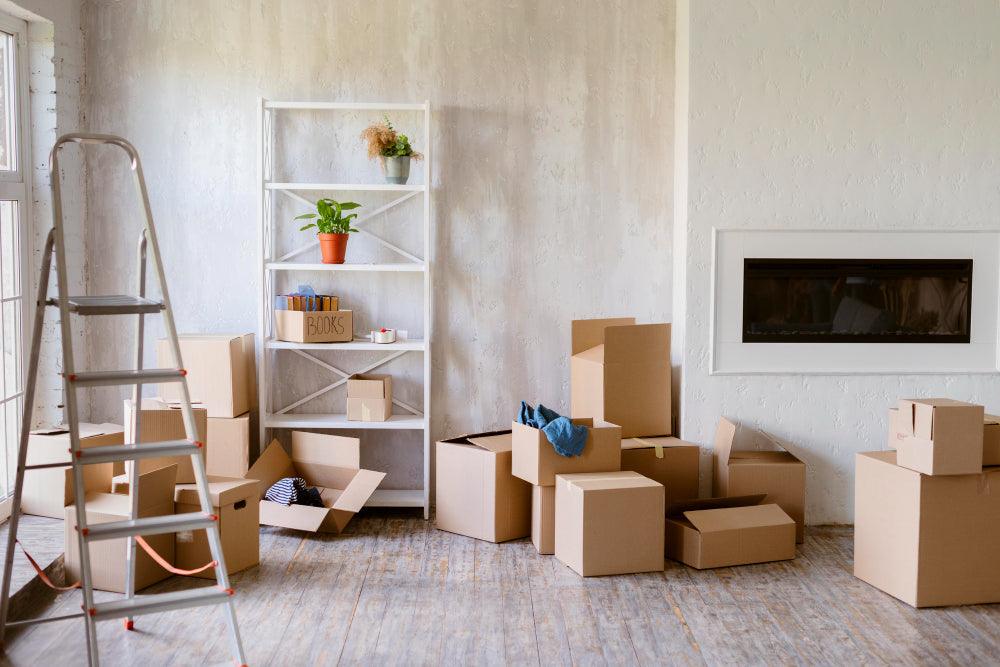Summer break or family visits may pose a challenge for international students. They often struggle with storing their belongings. This guide offers effective storage solutions for the belongings of international students. We’ll explore on-campus options, off-campus alternatives, and virtual storage.
By making informed choices and planning, you can enjoy your time off without stressing about your belongings. Together, let's discover the best storage strategies for international students!

Planning Ahead: Preparing for Student Storage
Planning and preparing for student storage is crucial before starting your journey. To make suitable choices for storing your belongings, assess your storage needs, research options, and budget accordingly. We advise taking the time to do this beforehand.
Assessing Storage Needs
You can determine the appropriate storage solution and avoid additional expenses by thoughtfully evaluating the items you need to store. Here are some practical considerations to help you assess your storage needs effectively:
- Inventory your belongings: Make a list of all the items you plan to store, such as clothing, furniture, electronics, books, and other accessories. Categorize them to gain an overview of what you have and how much space they will occupy.
- Identify essential and non-essential items: Decide which items are essential to bring with you and those that can be safely stored. Think practically about your absence period and whether taking certain items with you will be inconvenient. This will help you simplify and prioritize your items for storage.
- Winter items: If you're leaving during winter, consider storing seasonal items such as winter clothes or sports equipment, depending on the climate and your activities during your absence.
- Evaluate sentimental value and future use: Determine whether storing items with sentimental value or potential future use is necessary. Alternatively, consider leaving them with a trusted friend or family member.
- Anticipate future needs: Consider your plans beyond your current absence. Will you need the stored items in the future, or can they be donated or sold? Assess the long-term consequences to make informed decisions about what to store and for how long.
Researching Storage Options
After evaluating your storage needs, researching available options is the next crucial step. As an international student, there are several choices to consider. You may begin by exploring on-campus storage facilities provided by your university. It's essential to check their availability, reservation process, and any specific requirements you need to fulfill.
In addition, consider off-campus options like self-storage units. Research different storage facilities in your area, comparing key features such as location, security measures, pricing, and lease agreements. Factors like accessibility, hours of operation, and extra services they offer should also be considered.
Another alternative to explore is shared storage with local residents. Various online platforms connect individuals with extra storage space with those in need. This option offers a cost-effective solution and an opportunity to connect with the local community.
Budgeting for Storage Expenses
After you take the time to research your options, like on-campus facilities, off-campus storage units, and shared storage solutions, consider the length of time for storage and potential additional costs like packing supplies or transportation.
When evaluating costs, balance your overall budget and prioritize financial obligations. Explore cost-saving strategies to manage costs, such as box-storage companies or efficient packing.
Making a Checklist for Packing and Organizing Belongings
Want to stay organized and ensure nothing is overlooked? Then create a helpful checklist. Here's how:
- Categorize your items: Group your belongings into electronics, clothing, books, and personal documents. This makes it easier to pack and organize more methodically.
- Prioritize essential items: Identify the items you'll need immediate access upon your return. These include travel documents, necessary paperwork, or highly valued clothing. Keep them separate and easily accessible.
- Determine proper packing materials: To safeguard fragile or delicate items, assess the type of items you're storing to determine the appropriate packing materials. Use sturdy boxes, bubble wrap, packing tape, and other protective materials.
- Label your boxes: To aid organization, clearly label each box with its contents and any special handling instructions. This helps you locate specific items later.
- Create an inventory list: Make a detailed list of your items. Note down the contents of each box, and take photographs if possible. This serves as a reference when you need to retrieve specific items later.
- Maximize space: Utilize space more efficiently to reduce the boxes needed. Fill them while avoiding overpacking or causing damage.

4 Main Storage Options for International Students
On-Campus Storage
Many universities offer exclusive storage spaces designed specifically for student use. These storage areas have various advantages, such as easy accessibility, proximity to your dorm or campus, and additional security measures.
To utilize on-campus storage options, reservations must be made far in advance, and there may be specific requirements to fulfill. With designated storage areas or personal storage spaces within dormitories, on-campus storage can be convenient.
Self-Storage Units
Self-storage units are an ideal storage option for international students residing off-campus, offering a convenient and flexible way to store their belongings. Numerous unit sizes are available at these facilities to meet varying storage needs.
Self-storage facilities prioritize security by installing surveillance cameras, secure access codes, and on-site personnel. This guarantees your belongings' safety while you are away. In addition, this option offers flexibility in rental duration, enabling you to store belongings for as long as necessary without any long-term commitments.
Juujbox Storage
For international students in San Diego, Juujbox offers an innovative approach to self-storage - by delivering well-built, specially designed boxes right to your dormitory for easy packing. Once packed, Juujbox stores your boxes securely in their facilities. This saves you time, effort, and the need to rent a truck.
Storage with Juujbox isn't limited to items that fit in our storage boxes. We will also pick up and store items such as mini-fridges, scooters, bicycles, small appliances, luggage, and items you might already have in your boxes.
Shared Storage
It may be tempting for international students to consider shared storage options with local residents in their search for affordable storage solutions. However, it's crucial to weigh the potential drawbacks before deciding.
Entrusting your belongings to individuals without professional storage facilities or adequate security protocols can expose you to higher risks of theft, damage, or loss. Shared storage arrangements may also lack insurance coverage, potentially leading to unexpected financial losses.
Another issue to consider is accessibility. Different from professional storage facilities with set hours of operation, coordinating access with your host can be time-consuming and inconvenient. Retrieving or managing your stored belongings may depend on the host's schedule, potentially causing interruptions to your schedule.
How Much Does International Student Self-Storage Cost?
Student self-storage costs range from $50 to $400 per month. Here are some valuable points to keep in mind when estimating the cost of international student self-storage:
- Location: Depending on the city or region where you are studying, the cost of self-storage can vary significantly. It is important to note that storage facilities in major metropolitan areas or high-demand locations are likely to be more expensive compared to those in smaller towns or suburban areas.
- Unit Size: The cost of your storage unit depends on its size. While larger units are generally more expensive, assessing your storage needs carefully is essential to determine the appropriate unit size and avoid paying for unnecessary space.
- Rental Duration: Most storage facilities offer flexible rental options, allowing you to choose monthly or long-term contracts. It's essential to consider the length of your absence and select a rental duration that fits your needs and budget.
- Additional Services: While some self-storage facilities provide extra services like climate control, 24/7 access, insurance coverage, or free use of moving equipment, they add to the overall cost.
Tips for Cutting Down Self-Storage Costs for International Students
Downsizing and Decluttering Belongings
Before storing your items, it's a good idea to downsize and declutter. By reviewing each item and assessing its need, you can determine which items to sell, donate, or recycle, reducing your storage expenses. Less stuff equals a smaller storage unit, which means potential savings on monthly rental fees.
Proper Packing Techniques
Efficient packing is crucial to reduce the total cost of self-storage, and it starts with investing in high-quality packing materials like durable boxes, bubble wrap, and packing tape. Use effective packing techniques like disassembling furniture, stacking boxes vertically, and filling unused spaces with soft items or packing materials. Label each box accurately for quick retrieval of specific items.
Pay Only for What You Store
Juujbox's storage services can help international students reduce self-storage costs. Rather than renting a whole storage unit, you have a more affordable and adaptable approach that allows you to pay only for the specific items you store. With Juujbox, you can store your belongings without worrying about paying for extra space. This cost-effective and flexible option is a smart strategy for international students looking to save money.
Setting Reminders for Retrieval or Renewal
By setting reminders to retrieve or renew your self-storage unit, you can avoid unwanted charges and the need to extend your rental period. Keep track of the rental duration and make a note of the date when you need to collect your belongings or renew the contract. Whether you set reminders on your calendar or use smartphone apps, being proactive and organized is the key to reducing self-storage costs without hassle.

Final Thoughts
As an international student, navigating the storage options available can be challenging. However, research and planning will enable you to choose the best solution for storing your belongings during breaks or when visiting home. You can pick on-campus storage, shared storage, or innovative self-storage services like Juujbox.
The process requires evaluating your storage needs, budgeting smartly, and prioritizing the safety of your belongings. Our guide offers excellent tips for making the storage process streamlined, affordable, and secure. With the proper storage solution, you can confidently embark on your travels or visit your family, knowing your prized possessions are safe.



